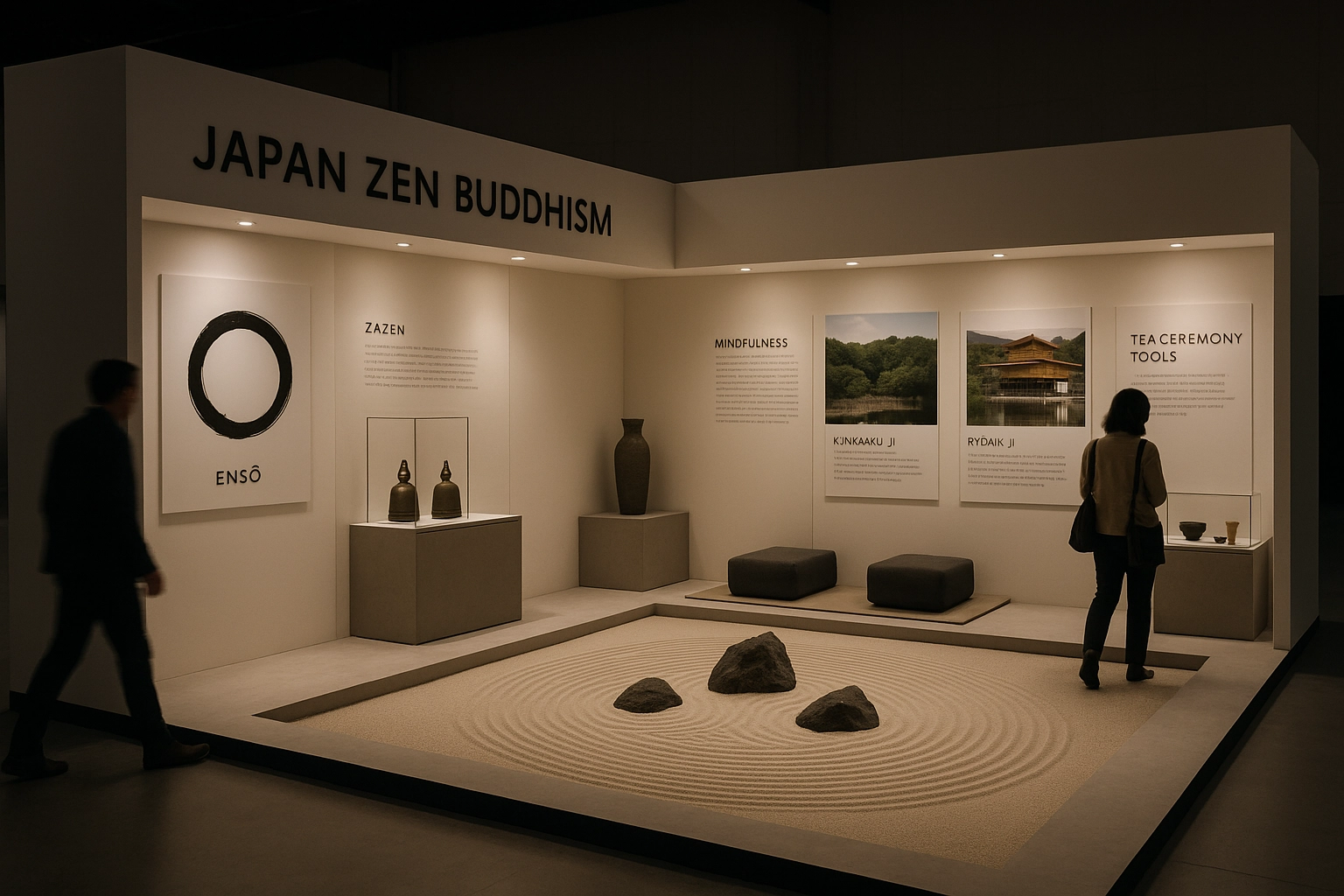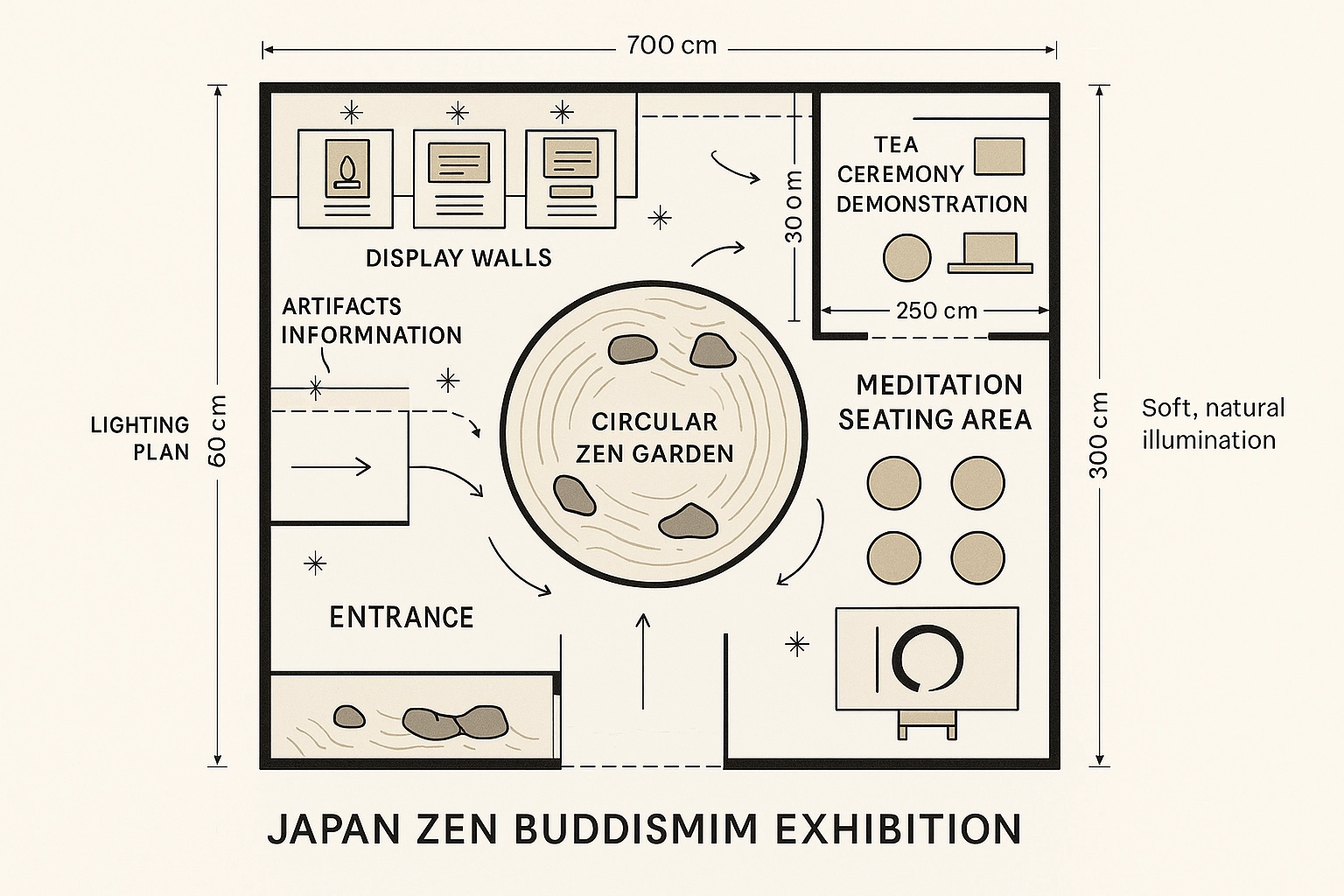Japan Zen Buddhism Exhibition
Explore the profound wisdom and serene beauty of Japanese Zen Buddhism through our immersive exhibition experience
Exhibition Layout & Experience

Exhibition Floor Plan
Interactive layout showing meditation areas, tea ceremony space, and zen garden

Main Exhibition Hall
Featuring circular zen garden, meditation seating, and informational displays

Sacred Zen Garden
Traditional rock garden with Ensō circle symbolizing enlightenment and mindfulness
Historical Origin
Zen Buddhism originated as a distinct school of Mahayana Buddhism in China, known as Chan, during the 6th century CE. It was introduced to Japan in the late 12th and early 13th centuries by Japanese monks who studied in China and brought back Chan teachings.
Emergence & Development
Zen Buddhism took root in Japan primarily through the efforts of two monks: Eisai (founder of the Rinzai school, 1191) and Dōgen (founder of the Sōtō school, 1227). Zen became prominent during the Kamakura period (1185–1333), when its teachings of discipline, simplicity, and meditation resonated with the samurai class and influenced Japanese culture, art, and philosophy.
Key Figures & Leaders
Eisai (1141–1215)
Introduced the Rinzai school of Zen from China, emphasized kōan practice.
Dōgen (1200–1253)
Founded the Sōtō school, emphasized shikantaza ("just sitting") meditation.
Hakuin Ekaku (1686–1769)
Revitalized Rinzai Zen, developed new kōans and teaching methods.
Core Concepts & Beliefs
Zazen
Seated meditation, the central practice in Zen.
Mindfulness & Present Moment Awareness
Living fully in the here and now.
Wabi-sabi
Appreciation of imperfection and impermanence.
Kōan
Paradoxical questions or statements used to transcend rational thought.
Fundamental Principles
Simplicity
Removing excess to focus on essence.
Direct Experience
Truth realized through practice, not theory.
Non-attachment
Letting go of desires and ego.
Harmony with Nature
Living in tune with the natural world.
Sacred Symbols
Ensō (Circle)
Symbolizes enlightenment, the universe, and the void.
Zen Garden
Represents the flow of nature and the mind.
Temple Bell
Used for calling to meditation and marking time.
Major Rituals & Ceremonies
Zazen Meditation Sessions
Daily sitting practice, sometimes in groups.
Tea Ceremony (Chanoyu)
Ritualized preparation and sharing of tea, expressing Zen aesthetics.
Sesshin
Intensive meditation retreats, often lasting several days.
Calligraphy Practice
Writing of Zen phrases or the Ensō circle as spiritual expression.
Global Influence & Cultural Impact
Global Influence
Zen has profoundly influenced global thought, design, and spirituality. Its concepts of mindfulness and minimalism inspire art, architecture, psychology, and wellness practices worldwide. Zen's approach to meditation has contributed significantly to the spread of mindfulness-based practices in the West.
Cultural Impact
Zen shaped Japanese culture—from the arts (ink painting, poetry, gardening) to the martial ethos of the samurai. It fostered values of discipline, self-control, and harmony. Zen aesthetics are central to Japanese design, cuisine, and daily life.
Geographical Spread
Zen Buddhism is practiced throughout Japan, with influential centers in Kyoto (Rinzai and Sōtō temples), Fukui (Eihei-ji), and Kamakura. It has spread globally, with Zen centers and practitioners in the Americas, Europe, and Australia.
Heritage & Legacy
Zen's enduring legacy includes its contribution to Japanese identity, its global meditation movement, and its role in the arts. Iconic Zen gardens and temples remain pilgrimage sites and UNESCO World Heritage sites.
Important Spiritual Books & Texts
Shōbōgenzō
by Dōgen
The Gateless Gate (Mumonkan)
kōan collection
The Blue Cliff Record (Hekiganroku)
kōan collection
Associated Holy Places & Structures
Eihei-ji
Head temple of Sōtō Zen, founded by Dōgen.
Ryoan-ji
World-renowned Zen rock garden in Kyoto.
Kinkaku-ji (Golden Pavilion)
Famous Zen Buddhist temple in Kyoto.
Kennin-ji
Kyoto's oldest Zen temple.
Memorable Quote
"To study the way is to study the self. To study the self is to forget the self."— Dōgen Zenji